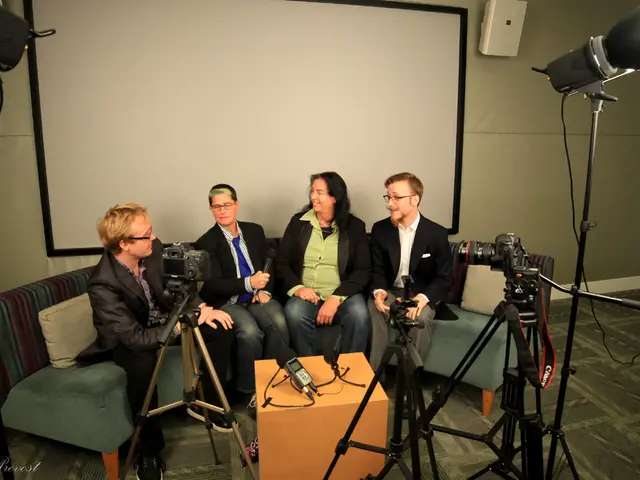Navigating the Chronic Frustration Trap at Work
Breaking Free from Downward Cycle: Strategies for Positive Change
Is work starting to feel more like a never-ending affair of annoyances? If the sentiment of annoyance becomes persistent, it can negatively impact both your performance and health. This guide aims to help you recognize and break free from this chronic frustration cycle.
Ever find yourself irritated by trivial issues at work, or do you instantly dislike changes and decisions that come your way? If work seems to be filled with more frustrations than joy, it's essential to address the issue promptly.
What triggers this chronic frustration spiral at work?
A negative spiral at work is often the result of a complex interplay of internal and external factors. It usually starts subtly and escalates over time if left unaddressed. According to career coach Ragnhild Struss, it typically progresses as one negative thought leads to another. As more negative events occur, you may feel increasingly confirmed in your negative worldview.
External circumstances, such as a poor work environment, excessive workload, or lack of recognition, might play a part, but Struss emphasizes that internal factors often provide the foundation on which external circumstances exacerbate dissatisfaction. These internal factors include:
- Self-doubt
- Perfectionism
- Low self-efficacy
- A pessimistic outlook coupled with negative beliefs like "I'm not good enough unless I'm perfect."
How can you tell if you're stuck in this cycle, or if it's just a rough phase?
It can be challenging to identify the gradual worsening of the situation. Reflecting on your behavior and taking feedback from coworkers, supervisors, friends, or family members can provide valuable insights. A journal where you regularly record thoughts, feelings, and reactions is a useful tool for self-reflection.
Each person is different in terms of susceptibility to this spiral. Those who are very perfectionistic may take longer to notice it, while those who are more mindful will likely notice it sooner.
Watch out for these warning signs:
Typical warning signs include:
- Persistent frustration
- Irritability and anger
- Increased likelihood of conflicts and disputes
- A feeling of hopelessness or helplessness
- Emotional exhaustion or burnout symptoms
- Diminished motivation and inner withdrawal
- Concentration problems
- Memory problems
- Decision-making difficulties
- Physically, signs can also manifest as chronic fatigue, sleep disturbances, headaches, and tensions.
Short-term solutions:
When you're experiencing an acute moment of frustration or overload, it helps to consciously pause, take a deep breath, and mentally step back from the stressful situation. This creates space for a more measured response.
Mindfulness exercises, such as meditation, breathing techniques, or body scans, help you gain clarity about the present moment, allowing you to respond more mindfully and prevent impulsive reactions. This could involve distancing yourself from stressful situations or taking a brief walk outside.
Long-term strategies:
To address the issue in the long term, it's crucial to recognize when you're stuck in a negative spiral. Laura Venz, a professor of work and organizational psychology at Leuphana University Lueneburg, recommends first analyzing your situation. Can the workload be decreased, for instance?
However, it's not always the individual who bears the sole responsibility for change. If the workload is too high, it needs to be adjusted, not the person. Helpful strategies can include better time management, conflict resolution skills in the team, or more leisure time relaxation.
If the problem is rooted in the manager, it may be necessary to change positions. Ragnhild Struss cautions against making hasty decisions, cautioning that people often seek blame in external circumstances. Those who don't know what truly satisfies them are unlikely to find it in a new job.
Struss stresses the importance of "job crafting" - consciously shaping your job to align with your personality, needs, and skills. The focus is on tasks, working methods, relationships, and attitudes to achieve sustainable satisfaction.
When professional help is needed:
If you find yourself so steeped in the cycle that you can't break free, or if the issue takes on pathological characteristics, external help may be required.
Surviving a Career Rut: Strategies for Maintaining Optimism
To permanently alter patterns and beliefs, professional reflection through coaching or psychological accompaniment may be indispensable. This helps establish new, helpful patterns.
Larger companies often provide health management services, and health insurance companies may offer support or recommend evidence-based apps for self-help. Additionally, the Federal Institute for Occupational Safety and Health (BAuA) offers access to various training options.
Preventing future recurrences:
It's also crucial to create lasting conditions that foster satisfaction and emotional stability. Struss views a negative spiral as a call to reassess your life and align it with your personality—it's a psychological wake-up call. A proactive and authentic approach to life is key to effectively preventing another spell of chronic frustration.
Before taking any action, it's vital to step back, analyze the situation, and communicate effectively. Asserting that you're overwhelmed is not a cause for shame and seeking help should be seen as a strength rather than a weakness.
- To combat the chronic frustration cycle at work, one might consider adopting a community policy that emphasizes workplace-wellness, health-and-self-development, and mental-health as integral components of overall job satisfaction.
- In addition to this, vocational training programs offered by community colleges or career development centers could provide valuable skills and techniques for coping with frustrations at work, fostering personal-growth and career-development along the way.
- By focusing on education-and-self-development, individuals can develop better decision-making skills, conflict resolution strategies, and stress management techniques, helping them navigate through frustrating situations more effectively.
- Moreover, implementing science-based wellness practices, such as mindfulness exercises and relaxation techniques, into the community policy can contribute to a healthy work environment that encourages mental and physical well-being, reducing the likelihood of chronic frustration.








